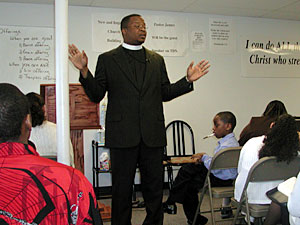|
Audio
Photos
Your Voice
|
St. Cloud's new civil rights vanguard
April 22, 2004
The civil rights scene in St. Cloud is taking a new shape. At a community meeting tonight, residents will have the chance to discuss a range of civil rights issues. The discussion comes against a backdrop of years of reports of discriminatory and racist patterns in the town. But a new civil rights vanguard might be turning things around.
St.Cloud, Minn. — In a barebones storefront near downtown St. Cloud, something new is happening. Little boys clap their hands, singers shake tambourines and wave their hands in the air.
They're holding a church service. The congregation is somewhat mixed racially, but it's mostly African American.
In the past few years, three predominantly African American churches have sprung up in St. Cloud, and with them has come a new kind of leader, the black pastor. Reverend James Alberts is one of them.
"Pastors take things and we bite on them and chew on them for you," Alberts says in his sermon. "And then we give them from us to you so that you can take them easily. And you can still use it, but sometimes you need to chew on it yourself."
Alberts is part of a new set of leaders who are trying to improve communication between people of color and the city's administration.
In March, Pastor Alberts and two other black pastors presided over a meeting between black community members, the St. Cloud police chief, and the mayor. At the meeting, citizens had the chance to air their concerns about racial profiling.
It was a big step forward in St. Cloud, where the news about race relations has often been dismal. A state report released last year, indicated a high incidence of racial profiling by the police force. According to the report, African Americans were stopped by police four times more often than expected, based on their percentage of the population.
In addition, racially motivated vandalism has plagued the university and minority owned businesses.
Pastor Alberts says any progress now is part of a longer, thornier process.
 | |||
"We're going to commit to this, and bring everything we got, and with the pastors, that's our churches, that's our people," he remarks. "And we're bringing people to the table, and we want to establish that commitment, and I believe that wasn't there before."
Many congregation members, such as Nancy Ford, say they're pleased to have Pastor Alberts as an advocate.
"The role of the pastor is to intercede on our behalf," Ford explains after the church services. "He steps out on our behalf with certain issues that might be becoming a problem in St. Cloud."
The city is also doing more to intercede on the behalf of minorities. It's not the first attempt to do so. A few years ago, community leaders put together a plan to combat racism and hired a consulting firm to assess their progress.
But at that time, the city's means of dealing with problems was toothless. The Human Rights Department simply referred all its cases to the state's Human Rights office.
Now, Baba Odukale is St. Cloud's new Human Rights director. He's a defense attorney and professor. He's working to strengthen the investigative and prosecutorial powers of his office.
In his office at city hall, he's dressed in a bright yellow garment from his native Nigeria. He says he's keen to change the way people of color perceive the city.
"I think the most important thing is gaining credibility of the people of St. Cloud," he says. "{It's important} for them to view city hall as a friendly place that will look out for them, and try to protect their rights."
Odukale has only been in his position about two months, but he has started to investigate complaints. He says he gets about 10 per week. And he says about half of those complaints involve race, though it's not clear yet if they're actionable.
Odukale says other administration members have been supportive of his efforts to change the way human rights violations are handled.
 | |||
Police Chief Dennis Ballantine agrees.
"I think we're all on the same page as to what we'd like to accomplish in the long run," he notes. "It's been years and years in the development of the negative image st cloud has, right or wrong. And it's time to change it."
Ballantine says he's trying to do his part to set a new tenor in town by diversifying his police force. That's a mandate from the mayor. The effort isn't hugely successful yet. Of the 90 sworn officers, three have minority backgrounds.
So while the leadership in town seems willing to make changes, progress is slow.
And another element is essential: community support. That's a lesson St. Paul NAACP leader Nathaniel Khaaliq knows well. He says the broader community must see how it will benefit from civil rights advances. He says that was clear when he helped draft a racial profiling agreement in St. Paul a couple years ago.
"It's important that it's something that the citizens buy into," Khaaliq asserts. "Because even though our agreement was mediated by the African American community, other people will benefit also."
In a way, the St. Cloud civil rights front is like an entity with many legs. Each element, whether it be minority leaders, city leaders, or the community, provides balance in some way. This collective entity's first steps may be slow and halting, but the movement does appear to be headed forward.
|
News Headlines
|
Related Subjects
|

